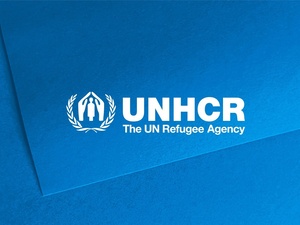Prominent Ukrainian singer Gaytana and the UN Refugee Agency present a new song and music video for the World Refugee Day 2020
Prominent Ukrainian singer Gaytana and the UN Refugee Agency present a new song and music video for the World Refugee Day 2020

The song called "A Paper Plane" reminds us of the necessity for everyone to feel supported and to have a home. Those who have lost their home too often feel in danger and live in fear. The song inspires them not to lose hope and to strive for their goals. Together with Gaytana, the song was sung by children from the music group "Zabava", Adel Nazarchuk and other talented children. Refugee children from the Democratic Republic of the Congo and Somalia, whose families found protection in Ukraine, took part in the creation of the music video.
UNHCR's annual report on global trends shows that as of the end of 2019, an unprecedented 79.5 million people have been displaced. This is the highest number of refugees, displaced persons and stateless people recorded by the Agency in its entire 70-year history.
“The problem of internal displacement is extremely important for Ukraine, as a large number of people have been displaced due to the difficult situation in Crimea and Donbas. More than 1.4 million displaced persons: behind this figure is a human tragedy, suffering, and the pain of separation from family and friends," said Pablo Mateu, UNHCR Representative in Ukraine.
https://www.youtube.com/watch?v=OxXiFlvxmnQ
The author of the original song in English is musician Aryan King. UNHCR is grateful to Gaytana for giving a beautiful voice and a Ukrainian translation to the original English song.
9 things you need to know about forced displacement:
- 100 million people at least were forced to flee their homes in the past decade, seeking refuge either in or outside their countries. That’s more people fleeing than the entire population of Egypt, the world’s 14th most populous country.
- Forced displacement has almost doubled since 2010 (41 million then vs 79.5 million now).
- 80 percent of the world’s displaced people are in countries or territories affected by acute food insecurity and malnutrition – many of them countries facing climate and natural disaster risk.
- More than three-quarters of the world’s refugees (77 percent) are caught up in situations of long-term displacement – for example the situation in Afghanistan, now in its fifth decade.
- More than eight of every 10 refugees (85 percent) are in developing countries, generally a country neighbouring the one they fled.
- Five countries account for two-thirds of people displaced across borders: Syria, Venezuela, Afghanistan, South Sudan and Myanmar.
- Global Trends Report counts all major displaced and refugee populations, including the 5.6 million Palestine refugees who fall under the care of the United Nations Relief and Works agency for Palestine.
- Displacement in cities and towns has become widespread. Among internally displaced populations two thirds were in urban or semi-urban areas as of 2019, according to available data.
- The 2030 Sustainable Development commitment of “leaving no one behind” now explicitly includes refugees, thanks to a new indicator on refugees approved by the UN Statistical Commission in March this year.









